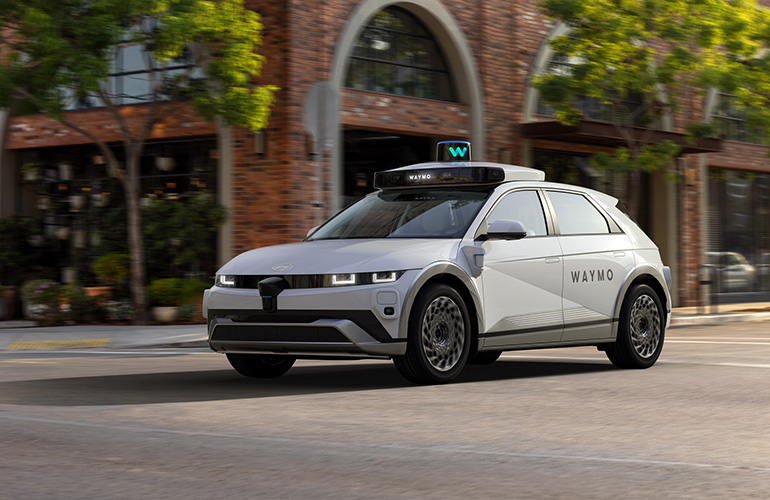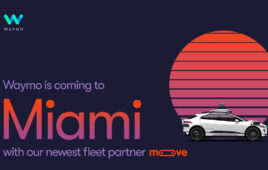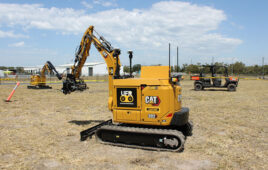|
Listen to this article
|

Waymo’s autonomous technology integrated into one of Hyundai’s all-electric IONIQ 5 SUVs. | Source: Waymo
Today, Waymo LLC and Hyundai Motor Co. said they have entered into a multi-year, strategic partnership. In the first phase of this collaboration, the companies plan to integrate the Waymo Driver, Waymo’s sixth-generation autonomous technology, into Hyundai’s all-electric IONIQ 5 SUV.
Waymo said it will add the IONIQ vehicles to the Waymo One fleet over time. The IONIQ 5 vehicles destined for the company‘s fleet will be assembled at the new Hyundai Motor Group Metaplant America (HMGMA) facility in Georgia and then integrated with Waymo’s autonomous technology.
The companies said they expect to produce a fleet of IONIQ 5s equipped with Waymo’s technology “in significant volume over multiple years to support Waymo One’s growing scale.” Initial on-road testing will begin by late 2025, and the Waymo-enabled IONIQ 5 will be available to Waymo One riders in the years to follow, according to Mountain View, Calif.-based Waymo.
“Hyundai and Waymo share a vision to improve the safety, efficiency, and convenience of how people move,” stated José Muñoz, president and global chief operating officer of Hyundai Motor Co. and president and CEO of Hyundai Motor North America.
“Waymo’s transformational technology is improving road safety where they operate, and the IONIQ 5 is the ideal vehicle to scale this further,” he added. “The team at our new manufacturing facility is ready to allocate a significant number of vehicles for the Waymo One fleet as it continues to expand. Importantly, this is the first step in the partnership between the two companies, and we are actively exploring additional opportunities for collaboration.”
Waymo fleet forges ahead with IONIQ 5
Hyundai will deliver the IONIQ 5 to Waymo with autonomy-ready modifications such as redundant hardware and power doors. The Seoul, South Korea-based automaker claimed that its all-electric vehicle will enable long driving shifts on a single charge, and its 800-volt architecture will minimize time out of service with some of the industry’s fastest charging speeds.
In addition, the vehicle’s interior will offer additional legroom, headroom, and rear cargo space for a comfortable riding experience, said Hyundai.
This partnership with Hyundai came just over a month after Waymo released its sixth-generation robotaxi. The company’s latest technology, including 13 cameras, four lidar sensors, six radars, and an array of external audio receivers (EARs), was rolled out on Geely’s all-electric Zeekr vehicles.
Waymo partnered with Geely in 2021 to integrate its Waymo Driver into a version of Zeekr. China-based Geely said Zeeker was designed in Sweden specifically for autonomous ride-hailing. Waymo previously used fully electric Jaguar I-PACE vehicles as the base of its robotaxis.
The Biden administration in May 2024 proposed a 100% tariff on electric vehicles from China, up from 25%. Although it’s not yet clear why Waymo decided to diversify its fleet with Hyundai’s vehicles, these newly announced vehicles wouldn’t be subject to the same tariffs.
Hyundai isn’t putting all of its AV eggs into one basket
This partnership means that Waymo is the first company to take part in Hyundai’s new automated vehicle (AV) foundry business unit. Announced in August, the unit aims to engineer and validate vehicles for AV developers such as Waymo.
“We recently announced the launch of Hyundai Motor Co.’s autonomous vehicle foundry business to provide global autonomous driving companies with vehicles capable of implementing SAE Level 4 or higher autonomous driving technology,” said Chang Song, president and head of Hyundai Motor Group’s Advanced Vehicle Platform (AVP) Division. “There is no better partner for our first agreement in this initiative than industry leader Waymo.”
But the program is just part of of Hyundai’s investments in the AV industry. In May, Hyundai announced a $475 million funding round for Motional.
At the time, Motional said the latest investment demonstrates Hyundai’s belief in the strategic importance of autonomy technology and its confidence in the company’s ability to capitalize on the market opportunity. Motional was founded as a joint venture between Hyundai and Aptiv.
Despite the investment, however, Motional lags behind Waymo when it comes to deployments. Earlier this year, the company said it plans to focus its resources on the continued development and generalization of its core driverless technology. At the same time, it is de-emphasizing near-term commercial deployments and ancillary activities.
Meanwhile, Waymo has spent 2024 rapidly expanding its service areas across three cities, Los Angeles, San Francisco, and Phoenix, Ariz. Currently, the Alphabet Inc. unit said it’s serving well over 50,000 paid rides per week across the three cities.







Tell Us What You Think!